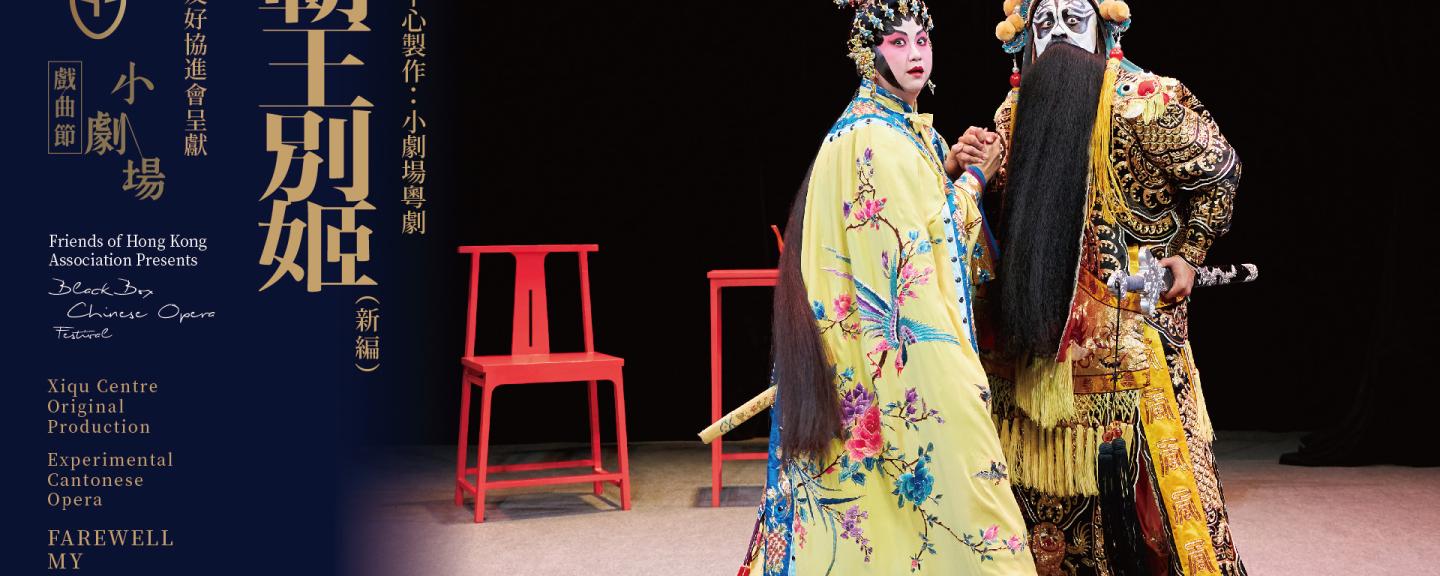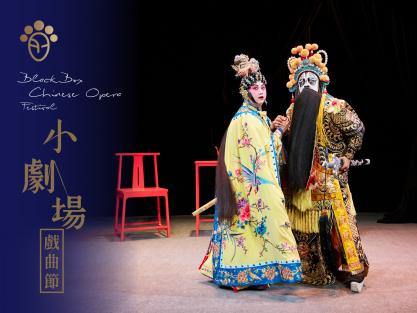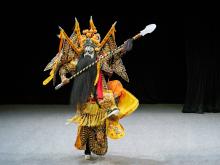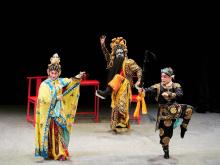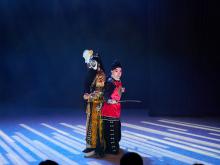Main
Description
小劇場粵劇《霸王別姬》(新編)為戲曲中心首部委約作品,糅合傳統與創新意念,結合傳統粵劇表演程式及當代舞台設計,細膩地刻劃項羽與虞姬之情,及訴說西楚霸王項羽面對江山美人盡失之際的悵然回眸,同時創作團隊祈望能給觀眾展現粵劇從古到今的風格。此劇曾獲邀參與亞洲多個城市之藝術節,屢獲殊榮。
所獲殊榮:
- 2022年北京紀念中國小劇場戲劇40周年系列活動「中國當代小劇場戲劇40年影響力榜單之40台劇目獎」
- 2018第五屆及2019年第六屆北京當代小劇場戲曲藝術節「優秀劇目獎」
- 2018年首屆中國(北京)演藝博覽會「2017年度最佳小劇場戲曲獎」
「這戲的藝術水平之高是香港少見,無論在劇情編排、動作、唱詞、走位和演員配合都相當出色。」
──香港粵劇演員文禮鳳
「可以入眼、入耳、入心、入夢的品質之作。此劇武戲文做,新意迭出。唱腔以梆黃為基礎,適當融入當代旋律和技法……頗具小劇場特色。」
──中國戲劇文學學會副會長梧桐(北京)
冠名贊助:
製作:

藝術及製作團隊:
監製:鍾珍珍*
編劇、導演、編曲:黎耀威、黃寶萱
技術總監:胡偉聰*
舞台設計:黃逸君
燈光設計:蕭健邦
音響設計:温新康
服裝設計:譚嘉儀
花旦頭飾設計及製作:曾俊霖
助理監製:李嘉隆*
製作經理:盧月芳*、陳嘉儀*
監製助理:莊淑雯*、丘穎晞*
演員:
黎耀威 飾 項羽
黃寶萱 飾 虞姬
吳立熙 飾 馬童、士兵
樂師:
音樂領導:毛奕俊
擊樂領導:陳定邦
樂師(依筆劃序排名):何卓晉、何卓濤、高永熙、梁淑妍、陳一凡、黃婉苓、黎家維、鍾詩玲、蘇紹勳
2016 年首演製作團隊:
燈光設計:馮海林
音響設計:袁卓華
服裝設計:譚嘉儀
*西九文化區職員
Gallery
Additional info
Tabs
The Xiqu Centre’s first commissioned work, Farewell My Concubine (New Adaptation) blends Cantonese opera traditions and bold innovations, blazing a new trial for a centuries-old art form as part of our mission to transcend traditional frameworks, explore new and original works and forge a new direction for Cantonese opera.
In this reimagining of the historic tragedy, told from the perspective of warlord Xiang Yu, we follow the hero’s downfall, from the siege and defeat of his troops, to his final farewell with his lover and subsequent suicide – each scene pushing him deeper into despair.
The work opens with the entry of Xiang Yu and a prelude demonstrating traditional Cantonese opera performance skills. The minimalist set, a contemporary take on the traditional “one table, two chairs” stage setup, is complemented by modern lighting design, with spotlights used to accentuate Xiang Yu’s isolation. Throughout the production, songs are sung in a combination of archaic Central Plains Mandarin (guanhua) and contemporary Cantonese, with tunes played by a traditional Cantonese opera luo gu (gongs and drums) ensemble. When Xiang Yu bids farewell to his consort, the performers adopt contemporary bangzi and erhuang singing styles while performing xiaoqu (folk tunes) in the archaic dialect. In the final scenes, the introduction of contemporary melodies accentuate Xiang Yu’s psychological turmoil.
Cantonese Opera
Originating in the Guangzhou region of southern China, Cantonese opera is a genre of Chinese traditional theatre that is popular in Guangdong, Guangxi, Hong Kong and Macau, as well as the Chinese diaspora in Southeast Asia, America and Europe. The singing style adopts elements of bangzi and erhuang (traditional vocal and phrasing styles), and combines tunes of various origins, including set tunes from gaoqiang (high-pitched) and Kunqu genres and elements of folk narrative singing. Cantonese opera was inscribed onto the UNESCO Representative List of the Intangible Cultural Heritage of Humanity in 2009.
